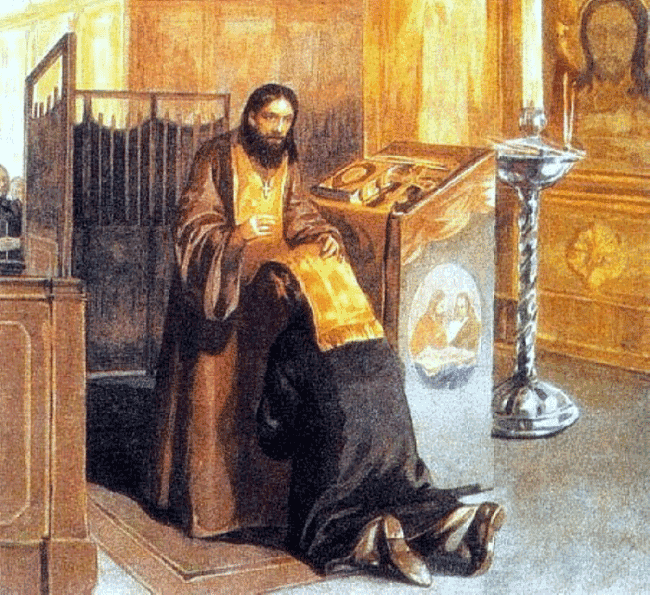
Just a few days ago, Patriarch Kirill, of Moscow and All Russia, made the following comments on confession during a diocesan assembly.
“It is unacceptable to make confession a means of inquiry or supervision, psychotherapy, overcoming conflicts or anything else. A priest listening to a confession should at this moment, to put it this way, lay aside all his functions – a mentor, guide, friend, interlocutor – all except one: a witness to human repentance,”
His Beatitude, Kirill, Patriarch of Moscow and All Russia
He further stated that “confession should only serve the matter of reconciliation between a person who sinned and God.” This is good advice for all of us priests. The USA has become an overly psychologized culture. Our tendency is to probe and prod to try to get to the root of a problem. But, that is not the purpose of confession. Getting to the root of the problem is indeed the purpose of spiritual direction, provided that it is handled by a holy priest or elder.
Fundamentally, confession is the opportunity for a person to have an intimate meeting with the grace of God. One Jewish author even makes the interesting comment that, “the Jewish concept of repentance, or teshuvah, provides a path of return to one’s true spiritual nature, a path that reunites the individual with a larger spiritual community. In comparison, psychotherapy provides a secular path toward a sense of individual psychic wholeness.” In other words, the purpose of confession, whether in the Hebrew Scriptures or in the Christian Church is to restore a person to the larger spiritual community. In our case, it is to restore the person to the Church.
It is true that sin separates us from God, but we have become so individualistic that we no longer realize that sin separates us from the community. In the Hebrew Scriptures, there are many Scriptures that point out that individual sin may lead to communal discipline. In the same way, there are several New Testament Scriptures that point out that individual sin may lead not just to divine discipline but also to corporate discipline. In the Early Church, various sins entailed discipline within the Church and not simply spiritual separation from God. Thus, the person who murdered might be forbidden from partaking of communion for various years. And, before anyone comments, no, the punishments of the Medieval Western Church were evil and unjust.
All of us sinners periodically separate ourselves from both God and the Church. What we primordially need is restoration to communion with God and communion with the Church. After we are restored, we may very well need ongoing talks with either a spiritually qualified priest or elder, or with a trained psychotherapist, psychologist, or chaplain. But, that comes after the restoration. First, we need to be restored.
His Beatitude is pointing out the danger of confusing confession and counseling. Both confession and counseling (or spiritual direction) are functions of the Church. Yet, they have different purposes. The purpose of confession is to restore communion at a point in time. The purpose of counseling (or spiritual direction) is to bring a slow and ongoing change that removes the roots of the problem that led to sinful behavior.
We are called to give wise counsel during confession, and we do. But, that wise counsel should be short and limited to the immediate confession. Should we see that further work is needed, then, yes, during confession we need to speak to the penitent to express our desire that they engage in further work. But, that further work may not be with us. It may be with us or it may be with an elder or it may be with a spiritual director or it may be with someone psychologically trained. The wisdom we exercise in confession is not simply the wisdom of knowing what short-term counsel to give, but also the wisdom to know when we need to be quiet and let someone else handle the issues raised in confession.
Confession is about a here and now restoration. Counseling/spiritual direction/psychotherapy is about long-term restoration. Both are important parts of the work of the Church. But, they should not be confused with one another. Let us, therefore, confess our flock with fear and trembling. Let us grant them the forgiveness that they seek. Let us be the “witness to human repentance” that His Beatitude asks us to be. And, when necessary, let us either make later appointments for pastoral care or let us refer them as appropriate. But, let us not confuse the two.



I don’t know about Orthodoxy, but one thing that’s helpful for this in Catholic theology is the reminder that it’s only necessary to confess sins in number and kind. One priest I know says that we ought to avoid trying to tell “the story of the sin,” for many reasons but mainly so that we do not try to justify the sin in the story.
Sigh, you would not believe how often I have heard sins being confessed and then being justified. It is difficult for us to simply confess, whether Catholic or Orthodox.
What forms of punishment were dispensed by the Orthodox Church during the same period Medieval Western Church administered its evil & unjust punishment?
I have absolutely no idea. However, it should be noted that the movie Fiddler on the Roof documents the expulsion of Jews from their beloved village and the burning of their houses. Pogroms were not uncommon. While those were State-sponsored, not Church-sponsored, nevertheless, the Church certainly did not speak out against them. Given the Russian tendency toward strictness, my guess would be that any discipline from the Church would have hewed strictly to the canons.